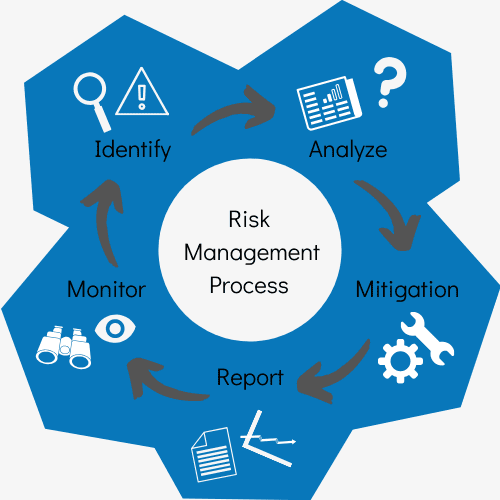Enhancing Business Efficiency Through the Importance of Risk Management
Enhancing Business Efficiency Through the Importance of Risk Management
Blog Article
Checking out the Significance of Risk Management for Effective Decision-Making Methods
In the complex globe of organization, Risk Management arises as an important consider the decision-making procedure. The capability to determine potential risks and possibilities, and strategize as necessary, can spell the difference in between success and failure. With tools such as SWOT and PESTEL, companies are geared up to make enlightened choices, promoting strength and versatility in an ever-changing atmosphere. Wondering just how this functions? Allow's unbox the characteristics even more.
Recognizing the Concept of Risk Management
Risk Management, an essential part in decision-making, is often misunderstood or oversimplified. Risk Management involves regimented and organized techniques, using data and informative analyses. From economic unpredictabilities, legal obligations, calculated Management mistakes, to mishaps and natural catastrophes, it resolves various risks - importance of risk management.
The Role of Risk Management in Decision-Making Processes
In the world of calculated preparation and service procedures, Risk Management plays an integral function in decision-making processes. It assists in recognizing potential dangers and uncertainties that might influence the accomplishment of organization objectives. By tracing these risks, business can develop strategies to mitigate their effect, making certain business continuity and security. Risk Management thus ends up being a vital tool in decision-making, helping leaders to make educated selections based on a detailed understanding of the threats entailed. It encourages a proactive method, allowing companies to prepare for and prepare for possible future scenarios. This substantially lowers the likelihood of negative effects, advertising much more effective and efficient decision-making methods. For that reason, Risk Management functions as an important element in the decision-making processes of any organization.

Just How Risk Management Improves Strategic Planning
In the context of calculated planning, Risk Management plays a crucial duty. Starting with the identification of potential threats, it additionally includes the implementation of Risk mitigation measures. The duty of Risk Management is not static but vibrant, as it requires constant surveillance and adjusting of methods.
Identifying Possible Threats

Carrying Out Risk Reduction
Having actually developed the importance of determining prospective dangers, the following step is to check out Risk mitigation. This process includes establishing and carrying out approaches to take care of recognized threats properly. It is a crucial aspect of strategic preparation as it boosts decision-making by decreasing possible adverse end results. Risk mitigation techniques can range from Risk evasion, Risk transfer, to take the chance of decrease. Each method must be customized to the particular Risk, considering its possible influence and the company's Risk resistance. In addition, reliable Risk mitigation calls for a deep understanding of the Risk landscape and the prospective impact of each Risk. This understanding makes it possible for companies to prioritize risks and allocate sources efficiently, making certain that one of the most significant threats are addressed initially.
Monitoring and Readjusting Techniques
Though Risk reduction is a crucial step in tactical planning, continual monitoring and advice change of these methods is just as vital. It also provides a chance to evaluate the success of the Risk Management actions, enabling changes to be made where necessary, more boosting critical planning. view Surveillance and readjusting Risk Management strategies is a vital component for boosting a company's durability and tactical planning.
Instance Researches: Successful Risk Management and Decision-Making
Worldwide of business and financing, effective Risk Management and decision-making commonly act as the pillars of thriving enterprises. One such entity is a multinational oil company that reduced financial loss by hedging against varying oil prices. In another circumstances, a technology startup flourished by identifying and approving risky, high-reward approaches in an unpredictable market. A worldwide bank, faced with governing unpredictabilities, effectively navigated the scenario via positive Risk analysis and vibrant decision-making. These cases highlight the worth of astute Risk Management in decision-making procedures. It is not the absence of Risk, however the Management of it, that often differentiates effective business from unsuccessful ones. These situations underscore the critical function of Risk Management in tactical decision-making. importance of risk management.
Tools and Strategies for Efficient Risk Management
These tools, such as Risk registers and heat maps, help in identifying and analyzing potential risks. Risk reaction methods, a vital part of Risk Management, entail accepting, avoiding, transferring, or mitigating threats. With these methods and tools, decision-makers can browse the facility landscape of Risk Management, consequently promoting educated and efficient decision-making.
Future Patterns in Risk Management and Decision-Making Strategies
As we explore the substantial landscape of Risk Management, it comes to be evident that the tools and methods used today will proceed to advance. The concept of Risk society, where every participant of a company is aware and included in Risk Management, will acquire a lot more prestige. These trends advertise an even more proactive and comprehensive method in the direction of Risk Management and decision-making.
Final thought

Risk Management thus becomes a crucial tool in decision-making, his explanation helping leaders to make enlightened choices based on a thorough understanding of the dangers included. Risk reduction approaches can vary from Risk avoidance, Risk transfer, to take the chance of decrease (importance of risk management). Effective Risk reduction requires a deep understanding of the Risk landscape and the possible effect of each Risk. Risk feedback techniques, an essential part of Risk Management, entail approving, avoiding, transferring, or mitigating threats. The principle of Risk culture, where every participant of an organization is mindful and involved in Risk Management, will certainly gain much more prominence
Report this page